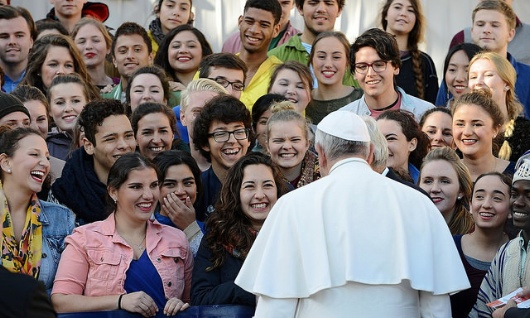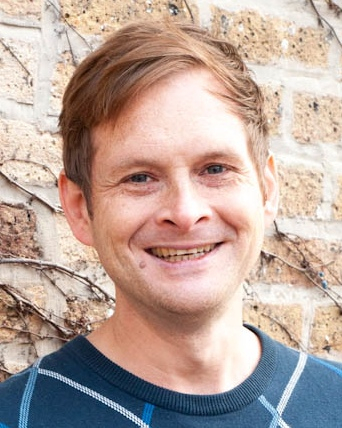Psychoanalysis's Influence on Pope Francis
March 13, 2018, marked five years of both Pope Francis’s pontificate and commentary upon it, with little signs of either flagging. In fact, scattered moments from the past few years indicate a still-underappreciated psychoanalytic influence on this first pope from the New World. Most memorably, a December 2016 interview made news due to his terming the production and consumption of slanted reporting coprophilia and coprophagy (“excrement loving” and “excrement eating,” in plain English). Half a year later, an Italian psychotherapist gifted Francis an odd joking notice that he put on his apartment door: “You are forbidden to complain,” the sign reads, impugning any transgressors as suffering from “a syndrome of victimization.” Finally, headlines this past summer revealed that back in his forties, the pope underwent six months of psychoanalysis. That last detail is much more than gossip, however
By David MihalyfyMarch 29, 2018
 March 13, 2018, marked five years of both Pope Francis’s pontificate and commentary upon it, with little signs of either flagging.
March 13, 2018, marked five years of both Pope Francis’s pontificate and commentary upon it, with little signs of either flagging.
In fact, scattered moments from the past few years indicate a still-underappreciated psychoanalytic influence on this first pope from the New World.
Most memorably, a December 2016 interview made news due to his terming the production and consumption of slanted reporting coprophilia and coprophagy (“excrement loving” and “excrement eating,” in plain English).
Half a year later, an Italian psychotherapist gifted Francis an odd joking notice that he put on his apartment door: “You are forbidden to complain,” the sign reads, impugning any transgressors as suffering from “a syndrome of victimization.”
Finally, headlines this past summer revealed that back in his forties, the pope underwent six months of psychoanalysis.
That last detail is much more than gossip, however. Instead, it helps explain seemingly personal peculiarities by pointing to psychoanalysis’s sway over his native Argentina.
Although dwindling elsewhere, a thriving culture of psychoanalysis has flourished in this country at the tip of South America.
Poke anywhere in Argentine culture, and you’ll likely find psychoanalysis.
Tango?
Famed composer Astor Piazzolla included an “Aria of the Analysts” in his 1968 opera Maria of Buenos Aires.
Plays and films?
As the New York Times has described, contemporary Argentinian stage and screen include imagined sessions with Freud and rom-com protagonists with crippling neuroses.
As the New York Times further elaborates, these cultural productions reflect real life. Thanks to middle-class patronage since the 1960s, everyday residents there know about and engage in psychoanalysis and other therapeutic practices to a rather large extent. For example, Argentina now supports over seven times as many practicing psychologists as the U.S.
In this regard, then, Pope Francis is just another Argentine, with that stereotypical interest sporadically surfacing throughout his pontificate.
For example, in one of his famous post-trip plane interviews, the pope reminisced about a “quite interesting” book called Be Glad You’re Neurotic, identifiable as a 1936 U.S. work translated into Spanish in 1948 as Alégrate de ser neurótico. He also said to treat one’s neuroses well and “give them some mate every day,” identifying one of his own as an undue attachment to daily routine and surroundings. In a 2015 address on the formation of priests, he likewise detailed how a psychologist once memorably schooled him on varying expressions of unconscious personal motivations in candidates for the priesthood.
Indeed, as this last example suggests, Francis typically invokes psychoanalysis as a possible developmental explanation underlying broader trends.
In his reflections on coprophilia and coprophagy, Francis first and foremost lengthily condemned the “temptation” of unproductive and one-sided scandal-mongering by newspapers, a primarily religious diagnosis of an obvious aspect of contemporary society. On this basis, he then only very briefly proceeded to describe that sin as coprophilia, and to note its purported developmental origins because of the “tendency to coprophagy.”
On the formation of priests, he likewise grabbed headlines by terming some priests “neurotic” and saying that they “scared” him. However, these remarks occurred in a larger conversation where Francis asserted that some candidates’ previous experience gives them a tendency to fundamentalism and thus poor pastoral relationships. Tellingly, he parsed these men’s minds via the remembered words of a wise psychologist: these youths “unconsciously” seek “strong structures that will defend them,” then they go on to repeat hierarchical behavior and even become “police torturers” once “they feel well established” in any place that “seek[s] the unconscious sick.”
In light of such clear examples, other papal remarks can assume psychoanalytic overtones as well. For example, in his environmental encyclical Laudato Si’, Francis notes that “[a]n outsider looking at our world would be amazed” at behavior like the overuse of air conditioning, “which at times appears self-destructive.” Quite possibly, these words very well hint at a murky drive toward death made manifest in our current ecological crisis.
In any case, these psychoanalytic moments are by no means highly elaborated or even sustained, and they certainly don’t represent some great intellectual moment like the use of Marxian class critique in liberation theology.
The question remains, then, why do Francis’s psychoanalytic moments make so much news?
Two explanations offer themselves, and each lies more with us than with Francis.
First, the continued presence of psychoanalysis in Argentina is also a story of its decline elsewhere.
Over time, our conception of the human being has become impoverished, because we have started seeing ourselves less as the helpless pawns of hazily perceived drives and more as transparent and predictable creatures in charge of our fate.
Not so long ago, however, many of us were conversant with ideas like the pope’s, especially during Freudianism’s mid-twentieth-century heyday. Although rather unbelievable now, an American bestseller like Robert Lindner’s slight 1954 trade paperback The Fifty-Minute Hour summarized actual clinical cases with key moments like dream interpretations identifying a patient’s tongue with his phallus. Similarly, legendary 1956 science fiction movie Forbidden Planet has a narrative climax in which (spoiler alert) the mysterious nighttime creatures assaulting the visiting spaceship are products of their host’s id, unwittingly released through rediscovered technology of a lost alien civilization.
Historically, we are not too far off from thought and mass culture like the pope’s, and their headline-grabbing peculiarity is only due to relatively recent shifts in our own intellectual landscape.
Second, we may also be uncomfortable with the common but untenable idea of discrete religious traditions, in which thought never changes or is ever influenced by broader cultural currents.
How many times do we talk about “Christian” or “Jewish” or “Muslim” as if there’s an unchanging essence separate or separable from the tradition? However, people express thoughts through culturally available categories. Francis’s psychoanalytic comments are just one more example of one possible shading of Christian culture, albeit in ways found increasingly strange outside Argentina.
If and when similar remarks of Francis occur again, they may generate more news, but those of us in the know about his background shouldn’t be too surprised at all.
Resources
- Forbidden Planet. Dir. Fred M. Wilcox. 1956.
- Kurian, Anne. “‘You Are Forbidden to Complain’: Notice on the Pope’s Door.” Zenit. July 14, 2017.
- Lindner, Robert. The Fifty-Minute Hour: A Collection of True Psychoanalytic Tales. Rinehart, 1955.
- O’Connell, Gerard. “Full Text of Pope Francis’ Press Conference On Plane Returning From Korea.” America. August 18, 2014.
- —. “In new book, Pope Francis says he consulted a psychoanalyst, speaks about the women in his life.” America. August 31, 2017.
- Pope Francis. Laudato Si’. May 24, 2015.
- “Pope’s Address on Mission, Formation of Priests.” Zenit. November 23, 2015.
- “Pope’s Interview With Belgian Weekly Newspaper ‘Tertio’.” Zenit. December 8, 2016.
- Romero, Simon. “Do Argentines Need Therapy? Pull Up a Couch.” The New York Times. August 18, 2012.
Photo Credit: Jim Forest/Flickr (cc)
 Author, David Mihalyfy (PhD’17), has taught in the University of Chicago Writing Program and served as a lecturer at the School of the Art Institute of Chicago. His writing on religion has appeared in The Atlantic online, Religion Dispatches, and Sightings. His work on higher education reform has appeared in Inside Higher Ed, Jacobin, and CounterPunch, and informed coverage in Crain’s Chicago Business and The Nation. You can follow him on Twitter: @mihalyfy. Author, David Mihalyfy (PhD’17), has taught in the University of Chicago Writing Program and served as a lecturer at the School of the Art Institute of Chicago. His writing on religion has appeared in The Atlantic online, Religion Dispatches, and Sightings. His work on higher education reform has appeared in Inside Higher Ed, Jacobin, and CounterPunch, and informed coverage in Crain’s Chicago Business and The Nation. You can follow him on Twitter: @mihalyfy. |
Sightings is edited by Brett Colasacco (AB’07, MDiv’10), a PhD candidate in Religion, Literature, and Visual Culture at the University of Chicago Divinity School. Sign up here to receive Sightings via email. You can also follow us on Facebook and Twitter.

